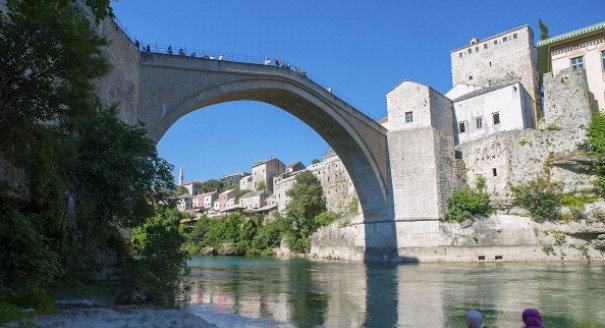Hats off to Angela Merkel.
Even though she is preoccupied with the Ukraine crisis, the German chancellor, along with her foreign and economy ministers, is hosting a summit of Western Balkan leaders in Berlin on August 28.
The timing couldn’t be better. The countries of the region—Albania, Bosnia and Herzegovina, Kosovo, Macedonia, Montenegro, and Serbia—are in desperate need of an EU perspective in order for their leaders to push through difficult and necessary reforms.
Were the reform agenda to be abandoned, the region’s dangerously high levels of unemployment (on average, over 25 percent), endemic corruption, and weak governance would strengthen the hands of populists and nationalists. Instability could follow. This is not what the EU needs in its own backyard given what’s already happening in Europe’s Eastern and Southern neighborhoods.
That is why the summit in Berlin should have substance. German diplomats say the event is intended to send a signal to leaders in the region that despite all the other crises in Europe’s neighborhoods, the Balkans have not been forgotten. The region’s diplomats, for their part, want to reassure their interlocutors that an EU perspective is still out there.
Under the motto “Wandel Durch Begegnung,” or “Change Through Contacts,” Merkel is pushing the idea that closer trade, investment, and economic ties will bring the region closer to the EU.
As it is, the region’s share of overall EU trade is minimal. It was 1 percent in 2013, with some individual countries such as Montenegro and Kosovo registering 0 percent. In contrast, the EU is the largest trading partner for the Western Balkans, accounting for over two-thirds of the region’s total trade.
Merkel also wants governments in the region to speed up reforms. She was blunt in her assessment of recent progress, which she described in a recent video podcast with Carnegie’s Cornelius Adebahr as proceeding “at a snail’s pace.”
Reforms are stalling for many reasons. In the region itself, there is growing skepticism about the EU’s commitment to enlargement as well as insufficient domestic political will to implement necessary changes.
Then there is the issue of vetoes. It is shameful that Greece can get away with vetoing the start of EU membership talks with Macedonia (a candidate country since 2005) or block NATO from granting a Membership Action Plan—the alliance’s preaccession mechanism—to the state, all because of a dispute over Macedonia’s name. No wonder reforms are stalling there.
Surely, the European Commission should be able to find ways to circumvent the Greek vetoes. After all, Greece’s own rocky road to democracy after the ousting of the military junta in 1974 was made possible by the perspective of joining the EU, which the country did in 1981.
Without the incentive of a clear path to accession, Western Balkan countries will be caught in a catch-22. If the region’s leaders continue to drag their feet over fundamental reforms, then EU governments that oppose further enlargement will be vindicated. Critics of widening the union can also argue that Bulgaria, Romania, and Croatia were far from ready to join the EU when they were admitted in 2007 and 2013.
Yet the one motivating factor for Western Balkan countries to reform in the first place has always been the prospect of joining the EU. When the European Commission decided to lift visa restrictions for Macedonia, Montenegro, and Serbia in 2009 and for Albania and Bosnia and Herzegovina in 2010, these countries’ governments grasped the reform nettle with a vengeance.
Since then, however, there has been little progress. “Reforms will be eroded if Brussels does not spell out its strategy for the region as a whole and for the individual countries,” said Gerald Knaus, director of the European Stability Initiative, an independent think tank for Southeast Europe. “As it is, the region is in a kind of crisis.”
It’s a special kind of crisis. It is a crisis of exhaustion arising from the trauma of the Yugoslav Wars during the 1990s. It is a crisis of frustration, as the euro crisis has dented economic growth and exacerbated unemployment.
It is also a crisis of cynicism: the region’s publics, generally, are no longer convinced that their countries have a European perspective, nor do they trust their leaders. And it is a crisis of disillusionment with the region’s pervasive corruption. Even the media are under increasing pressure to toe the line as local oligarchs take hold of the press, as constant reports by the Balkan Investigative Reporting Network, a group of journalists, make clear.
All told, democracy in the Western Balkans is not in good shape.
The one good piece of news is that Serbia and Kosovo have kept improving relations, thanks to the outgoing EU foreign policy chief, Catherine Ashton. She promised them the perspective of joining the EU. That has been their beacon. The fact that Belgrade and Pristina have embarked on such an extremely difficult path of reconciliation shows what pull the EU has. Not making use of that attraction would be a fatal mistake by the EU.







